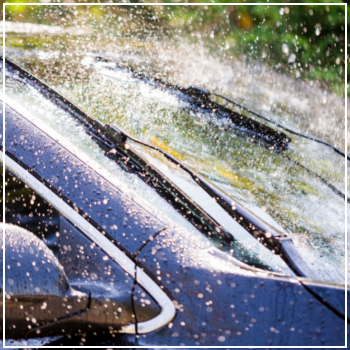How to Prepare Your Car for Summer Storms
High summer temperatures can also wreak havoc on your car's cooling system, making it work overtime. Tires are prone to over-inflation as air expands in the heat, and this puts extra strain on hoses, belts, and other rubber or plastic components. Given these conditions, it's crucial to ensure your car is prepared for summer storms. Here are some key areas to focus on. When heavy rain hits, your windshield wipers become essential for keeping your view clear. However, wiper blades degrade over time; their rubber can crack or peel, and the metal arms may stop moving smoothly. It's wise to inspect your wipers monthly and replace them every six months or sooner if they're showing signs of wear. Don't forget to keep your windshield wiper fluid topped up either—without it, the wipers will struggle to remove dirt and debris effectively. Your headlights are just as important as your wipers when visibility drops. If the bulbs burn out or moisture accumulates inside, your lights may not function properly. Have your headlights checked regularly for any issues, and address them promptly to avoid safety risks. Your tires serve as the critical connection between your car and the road. In wet conditions, they determine whether you maintain control or risk hydroplaning. To prepare for summer weather: We usually focus on cleaning the outside of the windshield, but the inside matters too. Fog and condensation can build up there if the glass is dirty or greasy. At the beginning of the season, give the interior glass a thorough cleaning. This way, when you turn on the defroster during a storm, it'll work efficiently without leaving streaks or haze. Your air conditioning isn't just for comfort—it’s vital for visibility during humid or rainy conditions. Don’t wait until the first storm hits to test your AC. Make sure the vents are blowing cool air, listen for unusual sounds, and look for leaks. Address any problems early to prevent overheating later in the season. Summer brings plenty of threats to your car's finish, from bird droppings and tree sap to UV rays and pollen. Even before a major storm strikes, these factors can damage your paint and promote rusting. Start the season by giving your car a thorough wash to remove winter grime like salt and dirt. Follow up with professional waxing to shield the paint from environmental harm. When parking, choose shaded spots away from trees to minimize sun exposure. Whenever possible, keep your car garaged during severe weather events to further protect it from potential damage. In case you need to evacuate due to an impending flood, ensure your car has sufficient fluids to get you safely to your destination. Regularly check the quality and levels of engine oil, transmission fluid, power steering fluid, brake fluid, coolant, and windshield washer fluid. Top them off or replace them as needed before any major storm. No matter the source of the damage—whether it's floodwaters, hail, or strong winds—DaSilva’s Auto Body can assess your vehicle and suggest appropriate repairs. To book an appointment, reach out to our Naugatuck location today. Folding Microporous Filter Element Melt-blown filter element; PP melt-blown filter element; water filter, liquid filtration, folding microporous filter Xinxiang Zhike Machinery Equipment Co.Ltd , https://www.zhikefilter.com It's easy to think that summer weather is gentler on your car compared to winter, but the truth is, it comes with its own set of challenges. From torrential rains that impair visibility to sudden hailstorms and flash floods, driving in summer can be just as demanding.
It's easy to think that summer weather is gentler on your car compared to winter, but the truth is, it comes with its own set of challenges. From torrential rains that impair visibility to sudden hailstorms and flash floods, driving in summer can be just as demanding.Windshield Wiper Care
Headlight Inspection
Tire Maintenance
Interior Glass Cleaning
AC System Check
Paint Protection
Fluid Checks